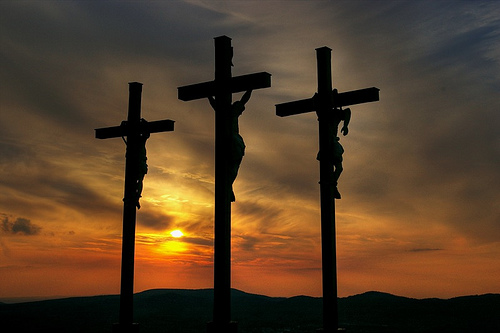
thepreachersword.com
Biblical accounts of Easter events seem to me improbable, puzzling and at the same time fascinating. As a kid I dreaded Good Friday because it entailed attending church and listening to a preacher who spoke a language I didn’t understand. In my adult years I’ve wondered why an all-powerful God would send his son to planet earth to be ridiculed and harassed by Jewish religious leaders and nailed to a cross by Roman soldiers. Surely he could have devised a more comprehensible scheme. One that did not require the ignominious death of his son on a cross.
By the time Jesus was born in Bethlehem, the Jews had already endured the cruelty of the Assyrians, and then captivity in Babylon during the reign of King Nebuchadnezzar. Permitted to return to their homeland by Darius, the Medo-Persian monarch, they had still been in bondage. Then the Greeks imposed Hellenization, weakening their culture and religion. And now the Roman emperor, Caesar Augustus was exacting oppressive taxes that impoverished them.
The 6th century B.C. Jewish prophets, Isaiah and Micah, had written about a coming Messiah, but when Jesus arrived and said he was the son of God, Jewish religious leaders turned against him early in his public life. They had long anticipated a powerful political saviour who would arrive with pomp and ceremony and deliver them from the succession of foreign masters. This man Jesus had come into the world as an infant, the son of a lowly carpenter.
He didn’t meet their expectations. His message was a radical departure from the longstanding “eye for an eye and tooth for tooth” response to adversaries. Rather, in his oft quoted Sermon on the Mount, he urged the gathering crowd to “love your enemies, bless those who curse you, do good to those who hate you, and pray for those who spitefully use you and persecute you.”
His message included a warning against the hypocrisy of Jewish religious leaders, the Sadducees and Pharisees. “They like to walk around in flowing robes,” he said, “and love to be greeted in the market places and have the most important seats in the synagogues and at banquets. They devour widows’ houses and for a show make lengthy prayers.”
Accustomed to reverential respect, such sentiments did not endear him to the religious elites. They were rattled by the rebukes and Jesus’ unwillingness to observe their myriad rules. They were incensed at the numbers of people flocking to listen to him. Equally galling was his claim to be the son of God. His radical philosophy was undermining their exalted positions.
The crowds recognized that, unlike the chief priests and teachers of the law, Jesus wasn’t socially or politically ambitious. He wasn’t seeking position, wealth or power. He made no effort to charm his audience. He wanted to free the people from man made strictures. His unorthodox, unvarnished message emphasized love, forgiveness and hope.
In line with what had been written by ancient prophets, he spoke of his own impending death. Referring to himself he said “he will be handed over to the Gentiles. They will mock him, insult him, spit on him and flog him, and kill him.” Then he added, “and on the third day he will rise again.”
One event in particular awed the crowds and shocked the Sadducees and Pharisees. This was Jesus’ act of raising Lazarus from the dead. It was too much for the religious elites. Seeing their tight control over the people being eroded, they decided he must die.
Crucifixion was common in the Roman Empire and they demanded that the governor, Pontius Pilate, order this fate for Jesus. After questioning him, Pilate said, “I find no reason for this man to die.” The Jewish leaders incited the onlookers to demand Jesus’ death and Pilate, fearing a disturbance, relented. He instructed a centurion and his troop to nail him to a cross on a hill outside the town. The cross was placed between 2 criminals, also on crosses. One mocked him, the other asked to be remembered. Jesus said, “today you will be with me in paradise.”

watermark.org
This plan for the redemption of humankind is so unusual and perplexing, many cannot embrace it. Even so, millions around the globe will celebrate Easter this weekend.
Although still not fully comprehending, I will be one of them.

This sounds remarkably familiar. “Then the Greeks imposed Hellenization, weakening their culture and religion. “Could it be said that the colonizers imposed a foreign religion and culture to weaken the culture and religion of the first nations,” I wonder!!!
Arnet